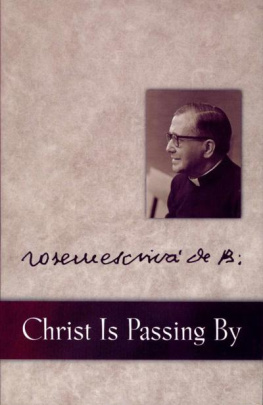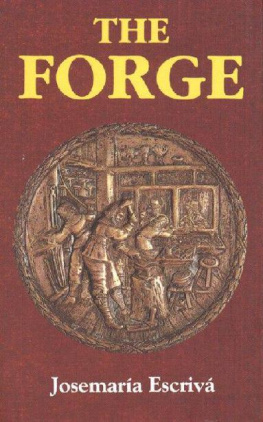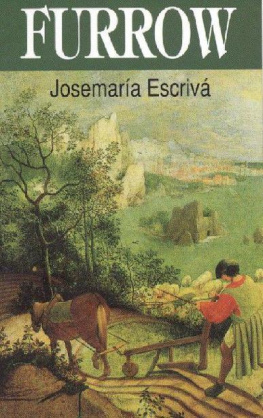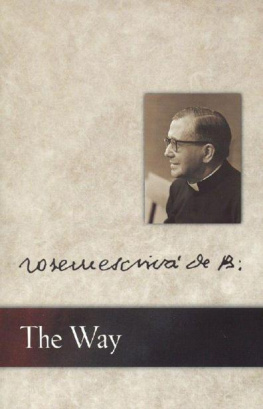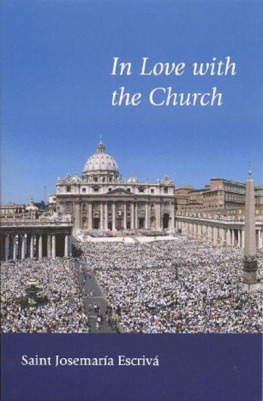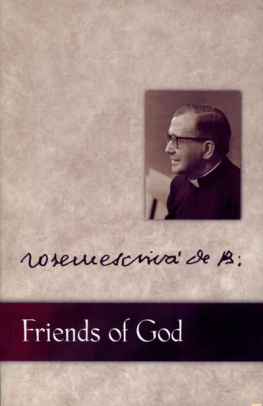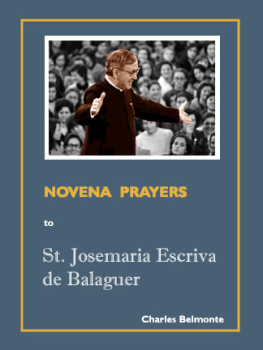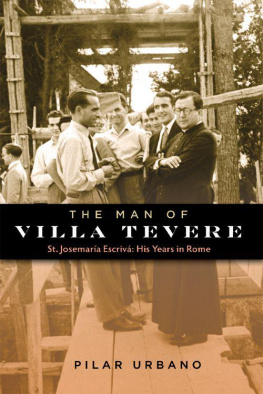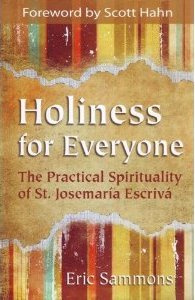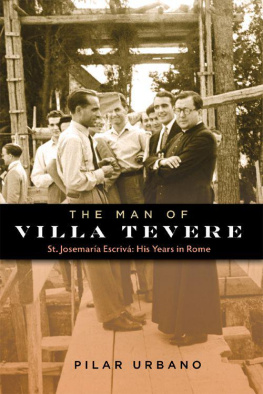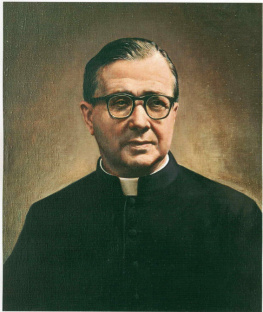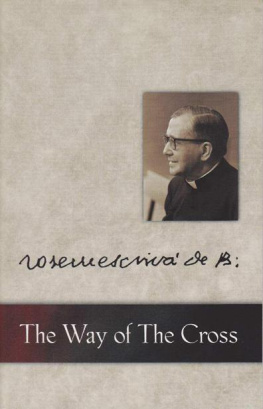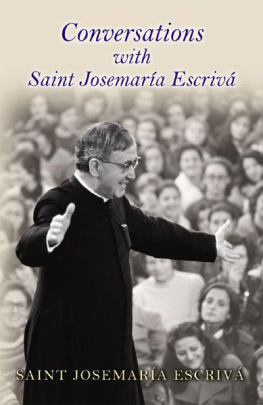St Josemaría Escrivá - Christ is Passing By
Here you can read online St Josemaría Escrivá - Christ is Passing By full text of the book (entire story) in english for free. Download pdf and epub, get meaning, cover and reviews about this ebook. year: 0, genre: Religion. Description of the work, (preface) as well as reviews are available. Best literature library LitArk.com created for fans of good reading and offers a wide selection of genres:
Romance novel
Science fiction
Adventure
Detective
Science
History
Home and family
Prose
Art
Politics
Computer
Non-fiction
Religion
Business
Children
Humor
Choose a favorite category and find really read worthwhile books. Enjoy immersion in the world of imagination, feel the emotions of the characters or learn something new for yourself, make an fascinating discovery.
- Book:Christ is Passing By
- Author:
- Genre:
- Year:0
- Rating:4 / 5
- Favourites:Add to favourites
- Your mark:
- 80
- 1
- 2
- 3
- 4
- 5
Christ is Passing By: summary, description and annotation
We offer to read an annotation, description, summary or preface (depends on what the author of the book "Christ is Passing By" wrote himself). If you haven't found the necessary information about the book — write in the comments, we will try to find it.
St Josemaría Escrivá: author's other books
Who wrote Christ is Passing By? Find out the surname, the name of the author of the book and a list of all author's works by series.
Christ is Passing By — read online for free the complete book (whole text) full work
Below is the text of the book, divided by pages. System saving the place of the last page read, allows you to conveniently read the book "Christ is Passing By" online for free, without having to search again every time where you left off. Put a bookmark, and you can go to the page where you finished reading at any time.
Font size:
Interval:
Bookmark:

Christ Is Passing By
JOSEMARA ESCRIV
Passing By

Library of Congress Cataloging-in-Publication Data
Escriv de Balaguer, Jos Mara, 19021975.
[Es Cristo que pasa. English]
Christ is passing by: homilies / Josmara Escriv.
p. cm.
Includes bibliographical references (p. ) and indexes.
ISBN 1889334456 (alk. paper) ISBN 1889334464 (pbk.: alk. paper)
1. Catholic ChurchSermons. 2. Sermons, SpanishTranslations into English. I. Title.
BX1756.E77 .E5513 2002
252.02dc21
2001057573
CHRIST IS PASSING BY
For more information on the life and writings of St. Josemara, please visit the following Websites:
www.josemariaescriva.info
www.escrivaworks.org
Translated from Es Cristo que pasa (Madrid: Ediciones Rialp, 1973).
Spanish edition copyright 1973, Josemara Escriv.
English translation copyright 1974, 1982, Four Courts Press, Dublin.
This edition copyright 2002 Scepter Publishers Inc.
P.O. Box 211, New York, NY 10018
www.scepterpublishers.org
All rights reserved
eBook ISBN 978-1-59417-101-7
Printed in the United States of America
Contents
In introducing this first volume of collected homilies by Monsignor Josemara Escriv de Balaguer, I recall, particularly, something he has said over and over again to all sorts of people, from all over the world: I am a priest, and all I can talk about is God. The founder of Opus Dei was ordained on March 28, 1925. Chosen from among men and appointed to act on behalf of men (Heb 5: 1), for almost fifty years he has helped bring Christianity alive in the minds and hearts of many people.
He has given expression to the fruitfulness of Christian priesthood, which is really the action of grace, through tireless preaching. It is not surprising that he says that preaching is the great passion of priests in Opus Dei. Since 1925, Monsignor Escriv de Balaguer has carried out an intense pastoral activity: first in country parishes, later in Madrid, particularly in the poorer districts and hospitals; then, in the nineteen-thirties, throughout Spain; and, since he moved to Rome in 1946, with people from every corner of the world.
I first came to know him in 1935, and he has always been the sametalking about God, trying to bring people closer to God, through catechism classes, days of recollection, retreats, spiritual guidance, and short, pithy letters which have brought peace to many souls. When toward the beginning of 1936 he began to feel ill, the diagnosis was, quite simply, that he was worn out. Sometimes he preached for as many as ten hours a day. He preached to the clergy of almost every diocese in Spain. The bishops invited him very often to preach to their clergy, and he would go all over the country by train, in the wretched trains of the time, at his own expense for no other compensation than the loving obligation of speaking about God.
I remember now, quite clearly, he wrote, that when I was a young priest I used to be given, quite often, two firm rules for getting ahead: the first was not to work, not to take on much apostolic activity, because that would only give rise to all kinds of envy and enemies. The second was not to write, because what one writes, even if written with precision and clarity, is usually misinterpreted. I thank God that I never followed that advice, and I am happy I did not become a priest to get ahead.
If Monsignor Escriv de Balaguer has ignored both pieces of advice, he has quite forgotten the first: not to work. And only his work, his daily apostolic activity, has prevented him from writing more, in benefit of souls. He has written two widely published books of spirituality The Way and Holy Rosary and various legal and theological studies. But the bulk of his writings consists in letters, instructions, and commentaries addressed to the members of Opus Dei, dealing only with spiritual subjects. Resisting any kind of publicity, he has rarely given interviews, despite repeated requests from the press, radio, and television of many countries; those few he has granted have been published in a book entitled Conversations with Monsignor Escriv . But nearly fifty years preaching has produced a great deal of material as yet unpublished; a small part of this makes up the present volume. Although these homilies need no special introduction, it may be useful to draw attention to certain characteristics found throughout this volume.
The first is their theological depth. They do not of course form any sort of treatise or study of any specific theme; they were preached, spoken, to people of varied cultural and social backgrounds, with a gift of tongues which makes them readily intelligible. However, the thoughts they contain are knitted together by a careful, loving knowledge of the word of God.
Note, for example, how the author comments on the gospel. He never simply brings it in for show or in a hackneyed way. Each verse has been meditated frequently and yields new aspects hidden, perhaps, for centuries. He is familiar with our Lord, with his mother Mary, with Saint Joseph, with the first twelve Apostles, with Martha, Mary, and Lazarus, with Joseph of Arimathea and Nicodemus, with the disciples of Emmaus and the holy women. He has come to know them through unending conversation, by placing himself in the gospel, becoming one more among participants of the scenes. It is not surprising therefore that some of Monsignor Escrivs commentaries coincide with those made more than fifteen centuries ago by the early Christian writers. His quotations from the Fathers of the Church seem quite at home in the text of these homilies, fully in the mainstream of the Churchs tradition.
A second characteristic is the immediate connection the homilies establish between the gospel teaching and the life of the ordinary Christian. They never lose themselves, are never theoretical or abstract; they do contain theory, but it always dovetails with everyday experience. Monsignor Escriv is never addressing a group of theorists or people merely curious about Christian spirituality. He is talking to real people who either already have Gods life in their soul or are ready to approach God in response to an inkling of his love. He is not speaking to a particular audience made up only of women or men or students or laborers or professional people. He talks to all of them at one and the same time, convinced as he is that if the word of God is preached with Christs love in ones heart, it will always find its way into every soul. The Holy Spirit moves souls intimately in a way you cannot detect from outside; it is he who lets the seed fall on good ground and yield a hundredfold.
A third characteristic is the style. It is perhaps the least important. Monsignor Escriv has a simple, direct, and easy style that helps each person to look at God and draw definite resolutions for his everyday life.
The homilies in this volume encircle the liturgical year, from Advent to the feast of Christ the King, but they do have certain themes in common. Their core is a sense of divine filiationa constant note in the authors preaching. He continually echoes Saint Pauls message: For all who are led by the Spirit of God are sons of God. For you did not receive the spirit of slavery to fall back into fear, but you have received the spirit of sonship. When we cry Abba! Father! it is the Spirit himself bearing witness with our spirit that we are children of God, and if children, then heirs, heirs of God and fellow heirs with Christ, provided we suffer with him in order that we may also be glorified with him (Rom 8: 1417).
This text speaks to us about the Blessed Trinity, which is another frequent theme in these homilies. It also reminds us that Jesus Christ is the way leading to the Father through the Holy Spirit. He is our brother, our friend the Friendour master and lord and king. The Christian life, then, means being continuously in touch with Christ in the context of our ordinary life, without abandoning our rightful place. How does this contact take place? Monsignor Escriv explains very concisely: In the bread and in the word.
Next pageFont size:
Interval:
Bookmark:
Similar books «Christ is Passing By»
Look at similar books to Christ is Passing By. We have selected literature similar in name and meaning in the hope of providing readers with more options to find new, interesting, not yet read works.
Discussion, reviews of the book Christ is Passing By and just readers' own opinions. Leave your comments, write what you think about the work, its meaning or the main characters. Specify what exactly you liked and what you didn't like, and why you think so.

